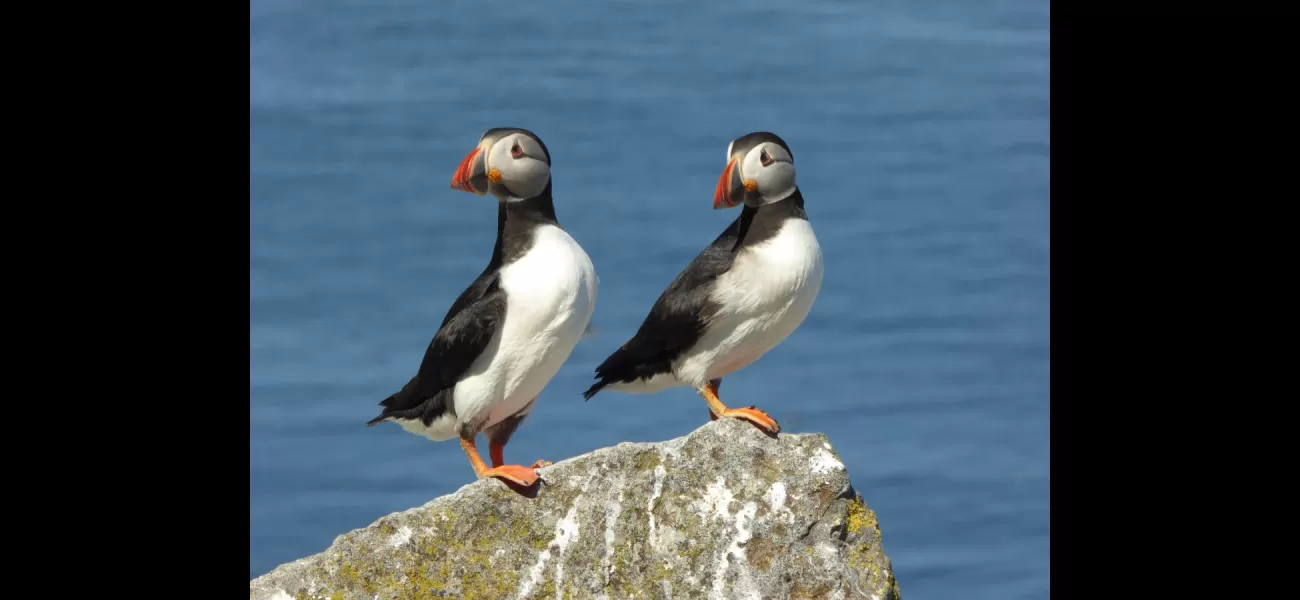Puffins return to Shetland for breeding season.
Puffins, known as the "clowns of the seas," have started returning to Scotland for breeding season at Sumburgh Head nature reserve in Shetland. Scotland is home to most of these colorful birds.
April 16th 2024.

Puffins, those lovable creatures with their vibrant beaks and striking orange feet, have affectionately earned the title of the 'clown of the seas'. And now, like clockwork, they have begun their annual return to Scotland for the breeding season. The first puffins have already made their way to Sumburgh Head nature reserve in Shetland, with more expected to follow in the coming weeks.
Scotland is a haven for puffins, housing around three quarters of the UK's population of these charming birds. But sadly, they are also one of our most endangered seabirds. So, it's truly a cause for celebration when we see their colorful arrival, marking the beginning of a new nesting season. Throughout April, more and more puffins will join their fellow feathered friends, staying to raise their adorable pufflings before departing at the end of summer.
During the winter months, the puffins retreat to the open sea, their exact whereabouts remaining a mystery. However, it is believed that they disperse widely across the North Sea and the vast Atlantic Ocean. But as they make their grand return to our shores, we are reminded of the significant decline in their numbers over the years. This is partly due to the decrease in sandeels, a vital food source for puffins, their chicks, and other marine creatures. Sadly, the effects of climate change and overfishing have caused a decline in the sandeel population.
Thankfully, RSPB Scotland has taken action by urging the Scottish Government to close sandeel fisheries, in hopes of reversing this concerning trend. Helen McLachlan, head of marine policy at RSPB Scotland, expresses her joy at the return of the puffins each spring. However, she also highlights the need to address broader issues threatening seabirds, including climate change, invasive predators, and human activities such as offshore developments and fisheries.
According to the most recent seabird census, Seabirds Count, published in November 2023, the UK has lost around 24% of its puffins since 2000. And if global warming continues unchecked, it is predicted that the UK's puffin population could decline by a staggering 90% by 2050. As nature lovers, it's important for us to recognize and take action against these alarming statistics.
So, let's celebrate the return of the puffins to our coastlines and use this as a reminder to protect and preserve these marvelous seabirds for generations to come. For more captivating wildlife stories, be sure to check out Scottish Field and subscribe to read the latest issue.
Scotland is a haven for puffins, housing around three quarters of the UK's population of these charming birds. But sadly, they are also one of our most endangered seabirds. So, it's truly a cause for celebration when we see their colorful arrival, marking the beginning of a new nesting season. Throughout April, more and more puffins will join their fellow feathered friends, staying to raise their adorable pufflings before departing at the end of summer.
During the winter months, the puffins retreat to the open sea, their exact whereabouts remaining a mystery. However, it is believed that they disperse widely across the North Sea and the vast Atlantic Ocean. But as they make their grand return to our shores, we are reminded of the significant decline in their numbers over the years. This is partly due to the decrease in sandeels, a vital food source for puffins, their chicks, and other marine creatures. Sadly, the effects of climate change and overfishing have caused a decline in the sandeel population.
Thankfully, RSPB Scotland has taken action by urging the Scottish Government to close sandeel fisheries, in hopes of reversing this concerning trend. Helen McLachlan, head of marine policy at RSPB Scotland, expresses her joy at the return of the puffins each spring. However, she also highlights the need to address broader issues threatening seabirds, including climate change, invasive predators, and human activities such as offshore developments and fisheries.
According to the most recent seabird census, Seabirds Count, published in November 2023, the UK has lost around 24% of its puffins since 2000. And if global warming continues unchecked, it is predicted that the UK's puffin population could decline by a staggering 90% by 2050. As nature lovers, it's important for us to recognize and take action against these alarming statistics.
So, let's celebrate the return of the puffins to our coastlines and use this as a reminder to protect and preserve these marvelous seabirds for generations to come. For more captivating wildlife stories, be sure to check out Scottish Field and subscribe to read the latest issue.
[This article has been trending online recently and has been generated with AI. Your feed is customized.]
[Generative AI is experimental.]
0
0
Submit Comment





